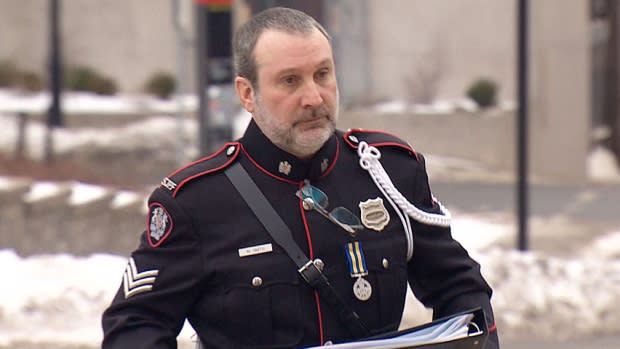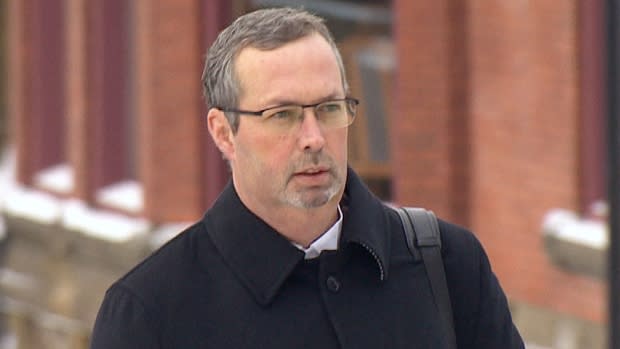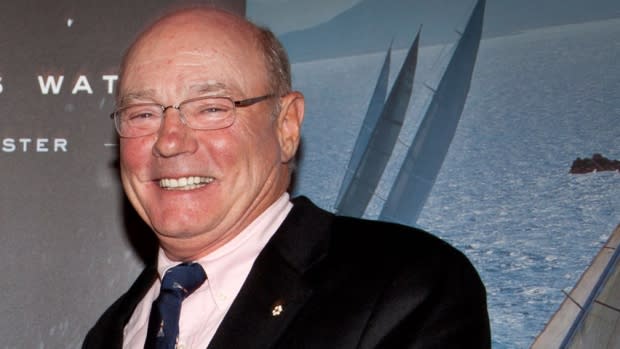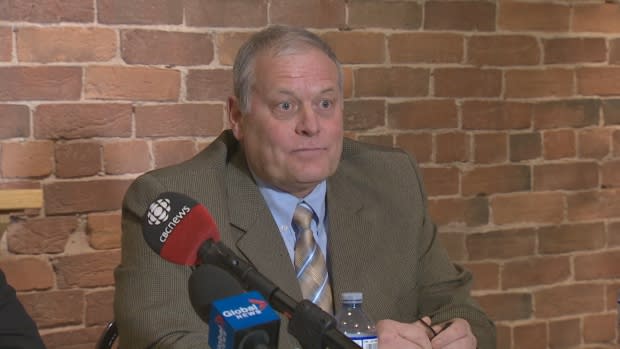'I'm not a liar': Officer admits he kept silent about ex-deputy chief at Oland crime scene
The head of the Saint John Police Force's forensic unit admitted Friday he kept silent about catching the former deputy chief and another officer in the bloody Richard Oland homicide scene.
But Sgt. Mark Smith testified it was never his intention to mislead the court.
"I admit to making mistakes at the crime scene, but I'm not a liar," he said.
Smith was being cross-examined by Dennis Oland's defence lawyer about why he had failed to mention in any of his notes or reports that he found then-inspector Glen McCloskey and then-constable Greg Oram in the victim's office on July 7, 2011, before he had finished processing the scene for evidence.
When Smith had been asked about the matter on Thursday, he said he knew he was going to testify and expected it would come up then.
On Friday, Michael Lacy challenged Smith's "proposed innocent explanation."
He pointed out Smith testified at Oland's preliminary inquiry in 2014 and at his first trial in 2015 but never mentioned finding McCloskey and Oram alone together in the office, with the body still present and without any protective gear on.
"And that's because the right question hadn't been asked of you, is that right?" asked Lacy.
"I was waiting for the question, yes," replied Smith.

"So because the right question hadn't been asked of you, you didn't volunteer it, correct?"
"You could say it like that, I guess," said Smith.
"So … your proposed innocent explanation that you were going to testify and it would all l come out — that was only if someone happened to ask you a question about it, correct?" pressed Lacy.
"It was discussed …," Smith started to say, his voice trailing off. After a long pause, he said, "You're right."

Oland, 50, is being retried for second-degree murder in the bludgeoning death of his father.
He was the last known person to see the multimillionaire alive when he visited him at his investment firm office at 52 Canterbury St. on the evening of July 6, 2011. The body of the 69-year-old was discovered in a pool of blood in the office the next morning. He had suffered 45 sharp- and blunt-force injuries.
A jury found Oland guilty in December 2015, but the New Brunswick Court of Appeal overturned his conviction and ordered a new trial, citing an error in the trial judge's instructions to the jury.
He is being tried by judge alone in Saint John's Court of Queen's Bench.
The trial is scheduled to resume Tuesday at 9:30 a.m.

Oland's defence team has accused the Crown of purposely "hiding" McCloskey and Oram by not calling them to testify at earlier proceedings.
The issue of McCloskey and Oram's unauthorized trip into the crime scene first arose during Oland's first trial with the testimony of retired Staff Sgt. Mike King.
King told the court McCloskey had encouraged him not to reveal to the court that McCloskey had entered the bloody office.
King testified he replied that he had "never lied on the stand in 32 years" and he "wasn't about to start."
When McCloskey testified the following day, he denied the allegation. He told the court he had entered the office twice — first under the supervision of Smith to observe the body and then again with Oram, out of "curiosity."
He admitted he went farther into the crime scene during his second trip in than Smith had allowed the first time.

Halifax police, at the request of then-chief John Bates, conducted a criminal investigation of McCloskey over the alleged "witness tampering." No charges were laid.
An independent investigator hired by the New Brunswick Police Commission to conduct a professional conduct review concluded McCloskey and King did have the conversation King described.
He found McCloskey used words to the effect of "you don't have to tell them that." He also found McCloskey made false statements at Oland's first trial and to Halifax police during their investigation.
McCloskey was scheduled to face an arbitration hearing but the matter was dropped when he retired earlier this year because the police watchdog only has the authority to discipline active officers.
The New Brunswick Police Association, which represents municipal officers, slammed the commission's investigation of McCloskey.
The commission is reviewing how it conducts investigations.

'Waiting for the hammer to drop'
On Friday, Lacy asked Smith about being interviewed by Halifax police during their criminal investigation.
"The way you described it to them, I'm going to suggest to you, sir was, 'Just kept waiting for the hammer to drop,'" said Lacy, referring to when the McCloskey-Oram issue would come up in court.
Smith said that when he was previously cross-examined by the defence and questioned about people being at the scene, he was only asked about a specific time period and had testified, "Not at that time."
He said he expected the defence would follow up on that answer, but they didn't. The defence at the time had moved on and I couldn't go back at that point — and I was concerned about that."
Lacy argued if Smith was concerned, he could have raised it on his own.
"Correct. And I should have," replied Smith.
Lacy said Smith had denied on Thursday that he was waiting for the "right question" before telling the court about the McCloskey-Oram matter. "It was not the truth, what you said yesterday, sir, was it?"
"I wouldn't say it wasn't the truth. I misspoke," said Smith.
Chance to 'clarify'
When court took a recess at the end of Lacy's cross-examination, Smith approached the counsel table and asked, "I don't get a chance to add to what was asked of me?"
"See, when you want to clarify something, you don't get a chance," he said to reporters as he stormed out of the courtroom.
When court resumed, lead Crown prosecutor P.J. Veniot gave Smith that opportunity on redirect.
"My Lord, it was never any intention of mine to mislead the court — this court, the court at the first trial or the preliminary trial," Smith told Justice Terrence Morrison.
He said he had discussed the McCloskey-Oram "situation" with the Crown before and after the preliminary inquiry and before the first trial.
"My thought was that either the Crown or the defence during their strategy, as they saw fit, would bring that up," he said.
"As like today, followup questions cannot be sometimes brought forward by a witness because you don't have time. I wasn't allowed to provide any of this earlier."

